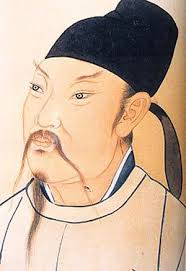 Born in the middle of the Tang Dynasty in 701, Li Po was one of the most prominent writers of his time in China, developing poetic art and producing about 1000 poems in his life time. He and fellow poet Du Fu were responsible for a golden time in Chinese writing, exploring relationships, the natural world, as well as the pleasures of wine.
Born in the middle of the Tang Dynasty in 701, Li Po was one of the most prominent writers of his time in China, developing poetic art and producing about 1000 poems in his life time. He and fellow poet Du Fu were responsible for a golden time in Chinese writing, exploring relationships, the natural world, as well as the pleasures of wine.
Li Po was born in Central Asia and moved to Sichuan province when he was five years old. He was an avid reader, devouring the popular Confucian works of the time, and a skilled swordsman by the time he reached his twenties. He is said to have taken part in many duels in his youth and was considered a master in martial arts.
In his mid-twenties, he decided to leave Szechuan and became something of a wanderer, getting married at some point, meeting various well-known Chinese personalities and giving away a good part of his family wealth. Throughout his time traveling he would write verses and poems about his life, notable for its conversational style and unusual perception of the world around him.
In 740 he made his way to Shandong and became part of a group of poets and writers who were primarily concerned with literature and the lavish consumption of wine. In 742 he earned the praise and admiration of the influential Wu Yun which led to Li Po being summoned to the Emperor’s palace. A banquet was held for him and he impressed the local royalty so much he was asked to take up a position as translator. Whilst a certain amount of mystery surrounds him, he was also fond of a drink and was often under the influence when the Emperor visited.

After offending the politically powerful Gao Lishi, the Emperor asked Li Po to leave the royal house. Po went back to wandering for the next ten years or so, writing many poems during that time. 1756 was the period of the An Lushan rebellions which saw the Emperor fleeing to safety. Li Po became adviser to one of the sons of Ming Huang in the royal household, a move that proved to be disastrous when a plan to take power backfired.
Po was imprisoned and placed under sentence of death. Fortunately, this was commuted to a life in exile when an old friend and army general, Guo Ziyi, pleaded his case. Though he was supposed to head for the province of Yelang, Po took his time and visited friends, wandering from place to place, enjoying the wine and writing his poetry.
Thus it was that Po was nowhere near his place of intended exile when he heard news that he had received a pardon from the Imperial Office. With the turmoil of the An Lushan rebellions having subsided, Po continued to wander, write and drink, eventually settling in Dangtu.

Li Po passed away in 762 and there is some mystery about his death, some saying that he died after being in a boat and trying to reach out to catch a moonbeam. The truth is that Po probably died from natural causes as a result of his hard drinking lifestyle.

